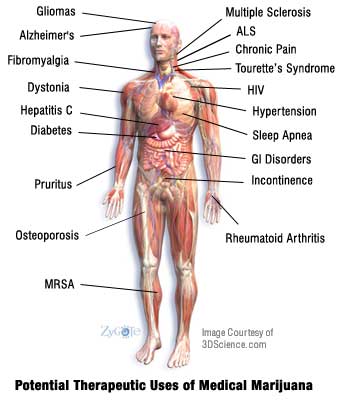That’s unfortunate, because cannabichromene is actually the second most abundant cannabinoid in marijuana, which means there is likely more CBC in your cannabis than CBD – even though CBD seems to get all the attention.
But research over the decades highlights a number of reasons why you should take notice of this non-psychoactive compound. Here’s 5 of them:
1. Fights Bacteria and Fungi
One of the earliest studies involving cannabichromene was published in 1981 by the University of Mississippi.
In the study, researchers found that CBC exhibited "strong" antibacterial effects on a variety of gram-positive, gram-negative and acid-fast bacteria – including E. coli and staph (S. aureus).
CBC showed "mild to moderate" activity against different types of fungi too, including a common food contaminant known as black mold (Aspergillus niger).
2. Anti-inflammatory Properties

Recent animal studies show CBC can reduce edema (swelling) as well as inflammation of the intestinal tract.
Interestingly, CBC appears to fight inflammation without activating cannabinoid receptors. This could explain why CBC produces a stronger anti-inflammatory effect when combined with other cannabinoids like THC.
3. Relieves Pain
Cannabichromene has also been found to reduce pain in animal models, although its effect may not be as strong as THC.
However, a study published in 2011 concluded that CBC and CBD could both fight pain by "interacting with several targets involved in the control of pain" at the spinal level.
Since CBC and CBD are both non-psychoactive, scientists are hopeful that these marijuana compounds can be used to treat pain – without the high.
4. Fights Depression
A more recent study from the University of Mississippi identified a significant antidepressant effect of cannabichromene in rat models, concluding that CBC and a number of other cannabinoids may "contribute to the overall mood-elevating properties of cannabis."
Scientists are still trying to figure out more about how CBC does this, since it doesn’t seem to activate the same pathways in the brain as THC.
5. Stimulates Brain Growth
The latest research on CBC – published just last month – highlighted one of the most unique benefits of this compound: It may actually help your brain grow. Specifically, CBC appeared to increase the viability of developing brain cells – a process known as neurogenesis.
Contrary to popular belief, neurogenesis doesn’t stop once you reach a certain age. However, it only occurs in a specific part of the adult brain called the hippocampus. The hippocampus is important for memory and learning and a lack of growth in this area is believed to contribute to a number of disorders, including depression and Alzheimer’s.
While cannabichromene’s ability to promote neurogenesis is a very recent finding, previous studies suggest THC and CBD can do the same.
As Dr. Xia Jiang of the University of Saskatchewan – one of the first scientists to uncover this remarkable effect of marijuana – explained in an interview with Science Daily:
"Most ‘drugs of abuse’ suppress neurogenesis. Only marijuana promotes neurogenesis."
Opiates, alcohol, nicotine, and cocaine are all known to inhibit brain growth. Thankfully, CBC and other chemicals in marijuana seem to have the opposite effect.
Source: LeafScience.com